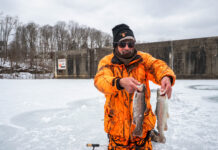It’s time. Time, that is, to put boats and motors to sleep for the winter. Do it right and a boat will last for extra years. Do it wrong or don’t do it at all and watch that prized piece of gear deteriorate dramatically.
Every reputable marine service department sees plenty of spring business as forgetful or lax boat owners head to the lake with boats and motors that weren’t properly put to bed in the fall.
And way too often damage caused by freezing, rodents, and old fuel can not only be annoying, but quite expensive. So let’s get to work. Two or three hours spent right now amount to a quick start-up next spring.
Start here
Clean the boat inside and out, scrub it, vacuum it, and remove every stain. Use a marine hull cleaner/polish to bring the hull back to life and break out a spray carpet cleaner for the floor.
Use a stiff scrub brush on the floor but be more gentle on the seats and other upholstered areas with vinyl cleaner and cotton towel. If you don’t remove stains and dirt before storing the boat you may never be able to remove them.
Tree leaves and things like smashed worms, minnows, or other organic leavings can be nearly permanent if allowed to remain for several months and common mildew is especially tough if left over the winter.
Fully clean
In fact, mildew stains can resist all known cleaning efforts including bleach. Take a little extra time to be sure no food is left in compartments or the mice will surely find it.
Remove pillows and life jackets or store them in a rodent-proof container. A couple trays of moth balls will also help to keep tiny critters at bay. Interestingly, it seems that wintering mice can survive on nothing more than a couple cushions and the most expensive life vest in the boat.
Stabilize your fuel
Be sure to completely drain the bilge and leave the plug out in case water finds its way in. And don’t forget to add an additive to the fuel tank to stabilize the gasoline.
Without a stabilizer, stored gas may not be usable in a few months. In fact, old gas can actually damage an engine or at the very least prevent it from running properly. According to marine mechanics, modern gasoline can go bad in just a matter of a couple months. Add that fact to the addition of ethanol in our fuels and understand that over half of the engine problems marine mechanics deal with are caused by ethanol.
Now tackle the trailer
Use a spray lube like WD-40 to protect springs, hinges, and other moving parts such as the winch. It’s also a good idea to repack the wheel bearings at this time.
And it’s the right time to touch up scratches and chipped paint. Check for any other damage such as light lenses, loose nuts, bolts, and other fasteners.
Now the tires
Tires are most often damaged the least from road miles and the most from exposure to the sun’s rays. Some boaters support their boats for the off-season on blocks or wheel jacks then remove the tires. Others follow the same support plan but simply cover their tires with black plastic or garbage bags.
Engines
Engines too, must be treated with care. Talk to your marine dealer about winterizing your engine.
It’s not hard but it does take some mechanical ability and an understanding of the systems.
Consider this: The outboard motor or stern drive motor you are using will cost thousands to replace, so why not schedule a winterization program with your local or favorite dealer who will offer you winterization costing for as little as $100?
Storage
Assuming the boat has a fitted mooring cover, make sure it is snapped tight and supported properly. If the boat will be stored outdoors, add a second cover such as a plastic tarp, which will add protection and prolong the life of the more expensive cover. I suggest a silver “over tarp” because it will tend to reflect the sun’s rays and won’t be as unpopular with neighbors as a blue tarp.
Heavy snow
Be aware that snow can be heavy, so be sure to place plenty of support under the covers. Shrink wrap has become increasingly popular with boaters who store their boats at a marina or other storage facility.
The cost is based on the length of the boat. Insist that the marina wrapping your boat participates in a recycling program with salvaged wraps. Winterizing a boat is a chore, a pre-freeze job worth doing correctly.
You’ll be a happy camper next spring if you do it right.












